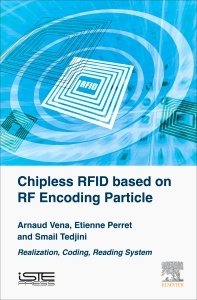Chipless RFID based on RF Encoding Particle Realization, Coding and Reading System
Auteurs : Vena Arnaud, Perret Etienne, Tedjini Smail

Chipless RFID based on RF Encoding Particle: Realization, Coding and Reading System explores the field of chipless identification based on the RF Encoding Particle (REP). The book covers the possibility of collecting information remotely with RF waves (RFID) with totally passive tags without wire, batteries, and chips, and even printed on paper. Despite the many benefits of RFID, deployment is still hindered by several economic and technological factors. Among these barriers are the high cost of tags, lack of reliability and security in the information contained in the RFID chip, and how tags are 'recycled.'
This book focuses on the development of chipless RFID tags, representing a new family of low cost tags. With this technology information is extracted from the electromagnetic response of the tag, which depends only on its geometry. Various solutions have been developed by the authors to increase the amount of information, reduce the surface of the tag, or improve the robustness of detection. Considerations such as realization using paper substrate, the development of a low cost detection system, and measurements in a real environment have been addressed for practical implementation.
1: Introduction to RFID Technologies
2: The Latest Developments on Chipless RFID Technologies
3: Information Coding Techniques in Chipless RFID
4: Design of Chipless RFID Tags
5: Implementation and Measurements of Chipless RFID Tags
Etienne Perret is an Associate Professor at the Grenoble Institute of Technology and a member of the Institut Universitaire de France. He conducts radiofrequency research on wireless communication systems, in particular RFID and chipless RFID.
Smail Tedjini is a Research Professor at Grenoble-INP, specializing in applied electromagnetics with teachings systems, RF circuits and components. His research involves simulation and modeling of circuits and Wireless type of radiofrequency systems and applications for RFID and UWB. Other research activities have concerned the rapid optoelectronics, transmission and RF signal processing in the optical domain.
- Introduces the chipless RFID REP approach as compared to classical chipless RFID, RFID, and barcode technologies
- Includes a demonstration of the practical and economic potential of chipless RFID technology, with detailed presentations and discussions of different test benches and comparisons
- Presents in detail numerous examples of chipless tags that are able to tackle specific problems: sensitivity of detection, encoding density, robustness of detection, problem of tag orientation, tags and reader cost, and compliance with emission standards
- Focuses on the development of chipless RFID tags, representing a new family of low cost tags
Date de parution : 08-2016
Ouvrage de 258 p.
15x22.8 cm



